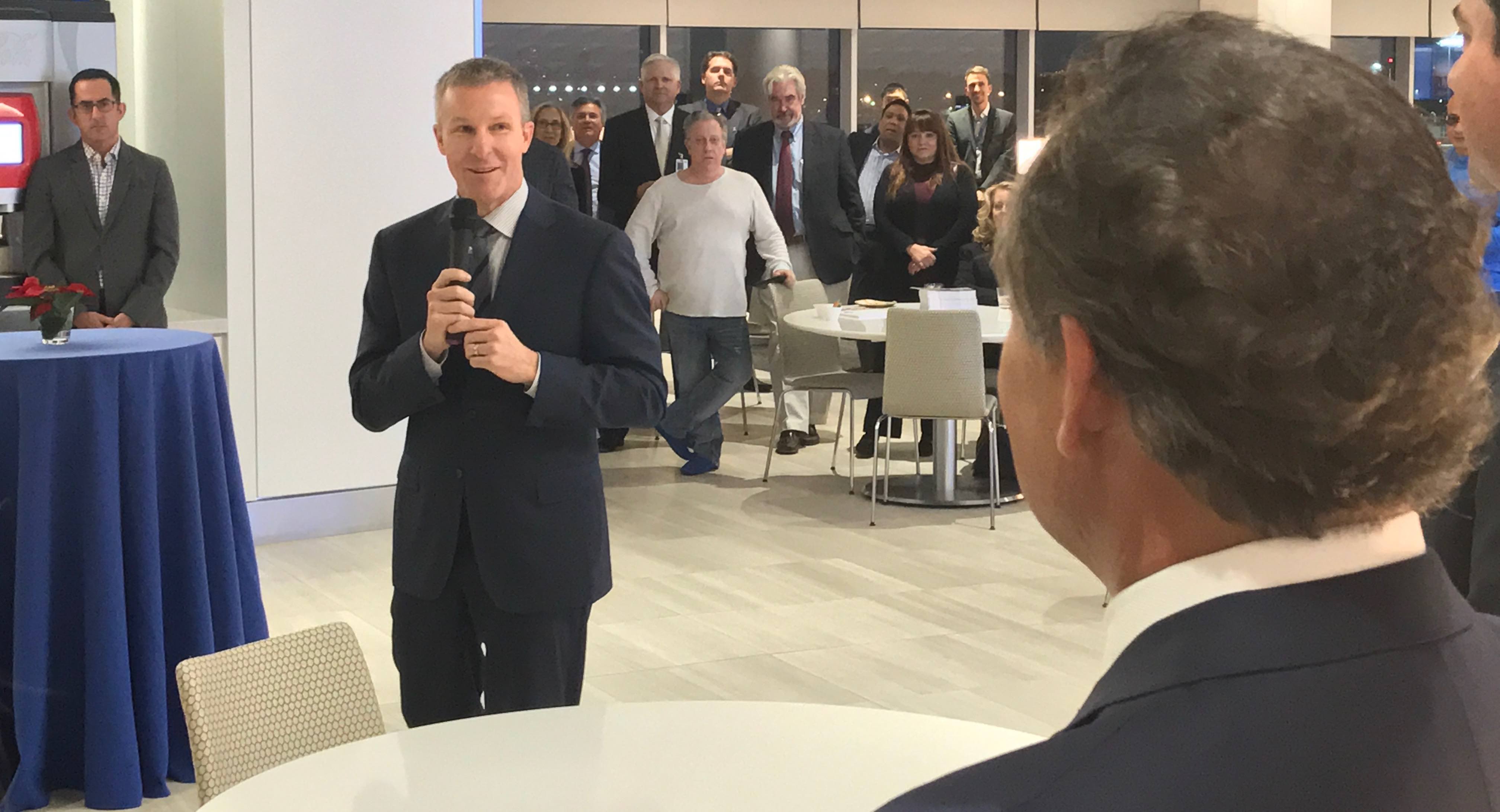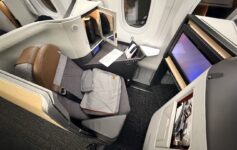
Dear Mr. Kirby,
A very Happy New Year to you. We met and chatted for quite awhile at the opening of the new United Club in T7 at LAX in November 2016. I admire your vision to make United a leading airline of the world.
Your tenure has been marked with exciting new longhaul and domestic route additions and the introduction of the new Polaris soft product on longhaul international flights. But recently we have seen a number of small but unfortunate cutbacks that I wish to address.
FAs ushered in the new year with the following memo:
Effective today (January 1, 2018), in addition to the already eliminated Grand Marnier, the following other liquors have been eliminated from liquor offerings on all worldwide flights as part of the continued service enhancements: Jim Beam Devil’s Cut, Canadian Club Reserve, Courvoisier VSOP, and Crown Royal.
The press office has told me–
We did remove some of the less popular liquor selections which will allow us to reduce some of the complexity from the operation and let us evaluate new products.
And while I will not nitpick, we’ve also seen recent cutbacks in first class dining: the elimination of meals on some routes and less choice on others. Furthermore, we have not seen a new Polaris Lounge open in over a year.
My concern is that you are unnecessarily taking a bean counter approach, similar to what Oscar Munoz’s disgraced predecessor Jeff Smisek did. Doesn’t Smisek provide us a perfect case study that United cannot cut its way to growth? Are United’s profits not robust enough to justify a continual improvement of the soft and hard product that will win long-term customers?
An Analogy
Allow me to use an analogy to make my point. My wife and I bought a fixer-upper house in Los Angeles. It needed new plumbing, new electricity, and a new foundation. It also needed a fresh paint job and the garden looked like a jungle. We hesitated over spending the exorbitant amount required to get the job done quickly and correctly. Surely, we deduced, we could gradually fix things and still enjoy our home. But we soon found that was not possible…not when the laundry room floor was sloping downward and the lights were flickering.
We embarked upon a massive effort to make our house beautiful, practical, and operationally efficient inside and out. And we succeeded. Even better, if we sold our house today we would reap a huge profit, exceeding the sum of our investment plus the average appreciation rate of homes in area. But more importantly, we have a house that we love and that has become our home.
My point is this: in order to create and sustain a world-class airline, you must be willing to make the investment in it. And why not now instead of later? Is cutting meals and liquor really necessary? Wouldn’t the more prudent course of action be to accelerate Polaris seat installation and lounge completion so that more passengers will actually pay for business class fares? Even if that reflects poorly on your quarterly report, can’t your forcefully justify it?
After all, United shares tanked 12% after Munoz admitted you dug yourselves “in a hole” on a recent earnings call. By prolonging the very sort upgrades that will lift you to sustained long-term growth, you continue to dig yourselves in a hole versus your competition, both domestic and international.
I’m heartened that you quickly realized many of the drawbacks of Basic Economy and have somewhat rolled it back. I trust you come to a similar conclusion for the recent onboard cutbacks and more importantly, will embrace that you can create a profitable airline by offering the best onboard product, operational reliability, and service. I believe United can be an industry leader in all three areas.
Thanks for reading my note and I wish you all the best in 2018 as you continue your important leadership role.
Best Regards,
Matthew




World class airline isn’t working out well for ME3 though, with posh lounges and showers in F. Most paying business class passengers are corporates who fly a specific airline because of company policy or convenience. I’d venture to say less than 10% of paying business class passengers are picking based on product when choosing between AA/DL/UA.
I think your 10% assumption is extreme. After years of price gouging by the airlines due to contract exclusivity corporates had with airlines in the 1990s and early 2000s the vast majority of Fortune 500 companies have wisen up and now instead have a list of selected preferred airlines that typically includes at least 2-3 airlines based in the US and several international carriers for multinational corporations.
You are correct in saying that ME3 airlines will have a hard time competing for US/EU corporate traffic despite having a far superior product since a relatively small percentage of large US/EU companies have contracts with them compared to the US/EU carriers. Therefore they don’t have to worry too much about measuring up their product up to that level.
However, employees do have far more leeway in choosing from a list of preferred carriers than being stuck with one airline and the US3 has realized that hence the aggressive investments in their premium products in the past several years to be at least match or be slightly better than their US/EU peers.
But then why do people choose to fly UA still when there are better business class products available on other US airlines? Or why didn’t everyone flee from AA with their old 763/772 business class seats or awful 763 on-time performance? I think Kirby is playing a game of chicken and isn’t in a hurry to retrofit the planes/lounges because people aren’t looking elsewhere. Even multinational companies who have contracts with both UA and SQ will put plenty of people on UA’s SIN-SFO flight even with similar pricing/schedule in that direction
I work for a large company and can confirm what @Golfingboy has said regarding large companies moving away from exclusive contracts with airlines and even embracing non-canceleable fares.
@Mark: I am one of those 10%; I travel on UA in J to Europe and because I live in Wyoming, my choices are limited. whether I am traveling on business (I own my own company) or pleasure. That said, I will sometimes pick up Lufthansa in Denver and go to FRA or MUC even though I can’t get seating in advance when I have combined fares. United is starting a DEN-LHR service I will evaluate because it will be 2 instead of 2 flights for me to the UK. Across the Pacific or Europe to Australasia I try to fly Singapore A/L. I am pretty sick and tired of this Polaris bait and switch.
Only United would describe in press release (and/or internal memo) it’s amenity cuts as “service enhancements”. Kirby is obviously another “bean counter” who could care less about customer service and being competitive.
Short term cost cuts mean short term profits means in-the-money options/stock grants. He doesn’t care about any sort of “investment” except the type that lines his pockets now. McKinsey 101.
Matthew, you’re a savvy traveler who knows and APPRECIATES the best. In other words, you are a in a tiny minority. Kettles want the cheapest flight. Stop. Is United the cheapest? Maybe….
Kirby is a spreadsheet guy, Cut X and save Y. But he doesn’t understand in the moment that cutting X leads to possible lost future business.
Get Scott Kirby out!
P.S. How about investing some $$ for the folks back in steerage. The 90s called and they want their 777s back. UA’s longhaul economy class product is depressing and uninspiring. I’ll pay a premium to fly on another airline with a more modern product.
I fly Air New Zealand and Qantas a lot.
I think United service and amenities is much better than these two airlines.
Don’t know who you are flying on.
Well ironically it was Jeff you started rolling out the improved domestic first class meals only to be chipped away by Scott.
Matthew, I applaud your stance and appreciate the fact that you are calling United and Scott Kirby out directly on some of these cheap, ticky-tack product cuts, but it’s obvious to me that Kirby takes the position that product doesn’t really matter. His view is that United’s deficit relative to Delta (and AA, to a lesser extent) is attributable to ‘structural’ issues, primarily due to two things: (1) a domestic network that lacks connectivity, coverage and gauge; and (2) an inefficient, outdated revenue management system. At the same time, he realizes the honeymoon period with new leadership is over and he sees a need to placate Wall Street to buy time to implement his changes, e.g. rebanking, adding domestic capacity, Gemini.
To this end, he’s rolled back some of the more favorable product developments of the late- and post-Smisek eras (because they are pure cost items and aren’t driving returns in the form of a yield premium) and paired it with a drawback on capex plus aggressive share repurchase (to make the investment community happy). The short-term expectation is that some of the product cuts will lead to slight marginal improvement.
With all that said, we are also starting to see some minor (but noticeable) quality cuts at Delta and AA, especially on the domestic side. This certainly doesn’t absolve Kirby of these actions, but at the very least, it provides some context.
Very insightful, Gene! Thanks for weighing in.
Another telling sign is that Kirby is aggressively reintroducing dozens more CRJ-200 under the new CPA with Air Wisky, after years of pulling back the 50-seater fleet. Why would he do that? Because I’m convinced he believes pax-ex is virtually meaningless, and this is a cheap way to grow domestic capacity (especially in smaller, less price-elastic markets) without having renegotiate scope or increase capital expenditures with a buying spree of mainline-category jets. He’s already pulled a lot of the easy levers, such as densification, redeploying 77As to the domestic market, increasing utilization, etc.
ExpressJet is also reactivating some ERJ-145s too. The hope, obviously, is that they’ll remain on short, less competitive routes, and I believe that’s true, but the fact remains that United is rapidly growing the size of its least desirable fleet, from a pax-ex perspective.
The onboard service cuts at UA during Smisek were just bringing the CO standards down to the pmUA bare bones standard.
Who remembers transcon non-PS dinners on pmUA.
A travesty.
International business class – mains served in TV dinner sized casserole dishes.
Fact of the matter is the flyertalkers are mad because Jeff made cuts to the upgrade rate and award availability – things other airlines did in tandem. UA was truly the ‘cheapest’ airline before the merger. If you didn’t want to pay for first class, but still sit in the big seat, it was the cheapest airline to fly if you did the miles to get “1K” status.